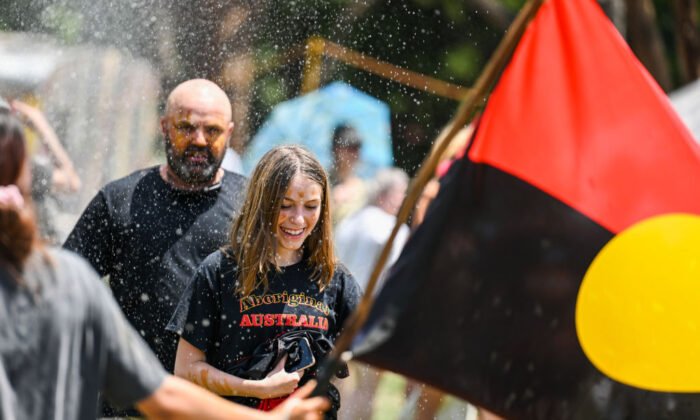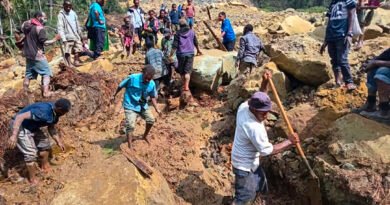There are concerns about the expansive powers granted for land transfers under the Aboriginal Land Act
Approximately 15 Queensland towns are currently undergoing land transfer processes under the Act.
An outback pub manager is urging action amid concerns that 95% of his hometown’s land could be transferred to an Aboriginal corporation.
Michael Offerdahl, a business owner in Toobeah, recently discovered plans for the land transfer via Goondiwindi Regional Council meeting minutes in January. The Bigambul Native Title Aboriginal Corporation (BNTAC) has outlined its intentions on their website.
The BNTAC aims to utilize 210 hectares of the 220-hectare Toobeah Reserve for various initiatives like land management, eco-tourism, and land regeneration.
However, Mr. Offerdahl questions the rationale behind granting “inalienable freehold” of the land to the Bigambul people, as no members of the tribe currently reside in the town.
He emphasized that the Bigambul people arrived in the region in the 1920s, long after the town’s establishment and other Indigenous tribes had settled in the area.
The name Toobeah, derived from the Gamilaroi word ‘dhuba-y,’ translates to “to point,” indicating the limited historical connection the Bigambul people have to the area.
Mr. Offerdahl worries about the potential impact of the land transfer on the town’s future development and commercial opportunities, stressing the need for clarity to avoid statewide repercussions.
“If you let them win and this is what they want to do, then this is going to happen all over Queensland.”
15 Towns Under Aboriginal Land Act Applications
Steve Andrew, the Mirani MP for One Nation, raised concerns in the state parliament regarding the proposed land transfers under the Aboriginal Land Act (ALA) of Queensland.
He inquired about the inclusion of the Toobeah community in the decision-making process, potential implications on property rights and access to essential services like water and sewage systems.
Another crucial question revolved around the number of towns facing pending ALA applications.
In response, the Department of Resources stated that while broad community consultation was not mandatory under the ALA, a community forum was held in Toobeah on March 4.
Information from the Goondiwindi Regional Council indicated that provisions would be made to ensure continued access to town water and bore facilities.

An adjacent land area close to the Toobeah township will be designated for the community’s use, including open space, potential town expansion, and stock requirements.
The council clarified that the land intended for expression of interest was reserved for camping related to the stock route network, ensuring continuity over the retained land.
Two land lots within the community, featuring rodeo facilities, will remain available for recreational purposes.
Mr. Andrew’s inquiry about other towns with expressions of interest remained unanswered, except for confirmation that 15 sites were under consideration.
The Epoch Times has learned that Eurong and Happy Valley on Fraser Island are among the areas of interest, with Indigenous groups seeking inalienable freehold handover of those sections.
It’s important to note that land transfers under the ALA are distinct from Native Title.
Thus far, over 6 million hectares of state land have been granted to Indigenous Australians in some capacity.
Distinguishing Between Aboriginal Land Acts and Native Title
The ALAs and Native Title both pertain to Indigenous claims to land, yet they differ in legal scope and function.
Native Title recognizes Indigenous people’s rights and interests in land and waters based on traditional laws and customs.
For instance, this includes rights to care for sacred sites, camp, hunt, fish, and conduct ceremonies in areas with established Indigenous connections. However, the specific rights can vary depending on individual circumstances.
Native Title law was recognized by the High Court of Australia in the seminal Mabo case in 1992, which overturned the doctrine of “terra nullius” that claimed Australia was unoccupied before European settlement.
In contrast, the ALA results in a direct land grant.
Originating as Commonwealth legislation in 1976 to provide Indigenous people in the Northern Territory with land rights based on historical and cultural ownership, the ALA was legislated in Queensland in 1991. The law acknowledges the concept of inalienable freehold title, entailing indefinite land ownership for Indigenous communities.
Rights under the ALA encompass land ownership, control, management, development, lease negotiations, and economic activities.
Indigenous Group’s Eco-Tourism Plans
The BNTAC rebutted media reports of rampant misinformation regarding the land claim.
They clarified that the alleged 95% land giveaway in Toobeah, encompassing infrastructure like the decommissioned town dump and recreational areas, was misleading.
The land subject to the claim amounts to just 0.18% of the Toobeah area and locals will retain unrestricted access to amenities and attractions like the recreational reserve.
The group dismissed claims of constructing social housing on the land, stating that it would primarily be utilized for cultural, ecological, economic development, and prosperity objectives aimed at the Bigambul people through regional eco-cultural tourism initiatives in Toobeah.
Justin Saunders, the Bigambul Executive Director, stressed that the community had been consulted multiple times, countering Mr. Offerdahl’s assertions.
The BNTAC highlighted that parts of the land suffered damage from activities like four-wheel driving and required rehabilitation to support traditional bush medicine and food plants.
They also emphasized the long-standing connection of the Bigambul people to the Toobeah region, referencing camps and reserves in the area until the 1950s and 1960s. The Bigambul people hold Native Title over the land.
Council Disputes Social Housing Allegations
The Epoch Times reached out to the Goondiwindi Regional Council led by former Queensland Nationals leader Lawrence Springborg.
The council referred to its online Q&A section on Toobeah, indicating that the future of the Toobeah Reserve was a state matter outside the council’s jurisdiction.
The Council clarified that the Toobeah Reserve was currently designated for camping or stock-related watering, while discussions with BNTAC were ongoing regarding shared use guidelines.
They also refuted the possibility of social housing development due to infrastructure constraints surpassing Toobeah’s capacity.
Transparency Advocated by Researcher
Gary Johns, Chairman of Close the Gap Research, emphasized the need for transparency in land transfers under the ALA.
He voiced concerns about the Queensland government giving exclusive land rights to specific groups without comprehensive consultation with stakeholders and the public.
Mr. Johns highlighted the lack of transparency and public awareness surrounding land transfers, contrasting it with Indigenous groups’ reliance on the UN’s Declaration on the Rights of Indigenous Peoples for consultation and consent.
He emphasized the importance of equitable treatment for all Queenslanders regarding land transfer decisions, asserting the need for public awareness and consultation.





